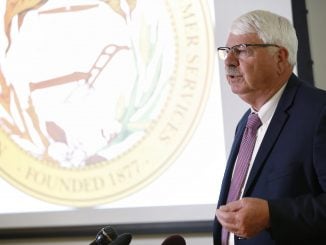
RALEIGH — An October audit of the state’s motor fleet has found issues with the way vehicles were assigned, managed and tracked.
N.C. State Auditor Beth Wood told the Joint Oversight Committee on General Government that the audit found multiple issues with the N.C. Motor Fleet Management (MFM) division’s handling of state vehicles and called the findings “just unimaginable.”
According to the audit, MFM was responsible for managing approximately 7,700 state-owned permanently assigned passenger motor vehicles as of September 2018. The approximate value of the fleet is $63 million.
“We found people assigned to a vehicle that haven’t worked for the state for 10 years,” Wood told the committee. She later added that it appeared no one at MFM was making the necessary changes and that when an employee left “no one is informing the motor fleet the person would no longer be there.”
Around 61 vehicles were assigned to individuals no longer employed by the State of North Carolina, some of those employees had been separated upwards of 10 years.
Members of the Joint Oversight Committee heard recommendations from Wood on oversight changes, which included establishing a commuter reimbursement rate to be used by all agencies. Committee members said they will be considering what kind of penalties might be instituted for non-compliance.
Among the findings were that the MFM did not provide enough oversight of the state’s permanently assigned state-owned vehicles regarding use policies and assignment.
The MFM also did not ensure that those vehicles were driven the minimum number of miles required for assignment. Auditors found that around 47% of the vehicles reviewed were not driven the required 3,150 miles per quarter. The audit also found compliance issues with commuter reimbursement policies and reimbursement rates.
Misuse findings included data on vehicles used by the Division of Motor Vehicles (DMV) and the Department of Public Safety. At the DMV, one inspector’s unauthorized commuting totaled close to $85,000 over three years.
At the Department of Public Safety, one State Highway Patrol sergeant incurred unauthorized commuting that totaled nearly $9,400 and a Private Protective Service’s director and supervisor had a combined $7,306 in “personal benefit from unauthorized commuting in state vehicles.”
The State Highway Patrol indicated they’ve made some changes to update policies on vehicle use and disciplinary actions are being taken in one of the cases.
MFM’s response agreed to several of the audit’s findings and said it would “periodically” remind agencies to utilize MFM’s website to report changes to vehicle use and policies.
Motor Fleet Director Robert Riddle was asked by the committee how he was going to correct the problems and he said that MFM has been cleaning up their data and has processed over 1,000 change assignments just since July.
During his presentation, Riddle said that MFM was working on improving communications, including monthly emails to fleet coordinators and an annual assignment verification report. The agency would also be automating quarterly utilization and mileage exemption reports.
The MFM is overseen by the Department of Administration. Over the last decade, both former governors McCrory and Perdue had called for an overhaul to MFM’s management and policies.
An audit conducted by Wood’s office of MFM in 2017 found similar problems to the current audit. At that time, MFM claimed they were installing “telematics” by the end of that fiscal year. The 2017 audit found misuse issues by a DMV inspector using his vehicle to commute over a three-year period to the tune of $85,000.
The call for using telematics as an accountability measure was first made by the legislature Program Evaluation Division in a 2012 report to the Joint Legislative Program Evaluation Oversight Committee.
Similar findings were contained in a 2019 audit of MFM by Wood’s agency. That audit found the same underutilization and mileage reimbursement issues as the other audits. The audit looked at 793 assigned vehicles and found that 61 of them were assigned to individuals that no longer worked for the state. Of those 61, seven were assigned to someone who did not have a valid North Carolina driver’s license.
In its 2019 response, MFM said the agency was implementing policies that would better monitor vehicle mileage as well as making sure agencies met required annual mileage thresholds.


